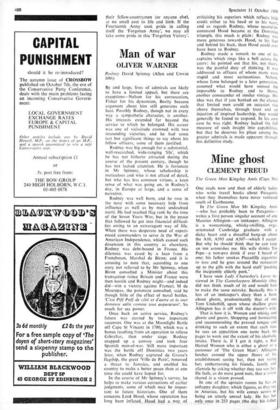Man of war
OLIVER WARNER
Rodney David Spinney (Allen and Unwin 100s) By and large, lives of admirals are likely to have a limited appeal, but there are exceptions—Nelson for his corruscation, Fisher for his dynamism, Beatty because argument about him still generates such heat. Possibly Rodney, though not in every way a sympathetic character, is another. His interests extended far beyond the service to which he belonged. His career was one of vicissitude crowned with two resounding victories, and he had some tart but significant things to say about his fellow officers, some of them justified.
Rodney was big enough for a substantial, well-researched, wide-ranging 'life', which he has not hitherto attracted during the course of the present century, though he has not lacked attention. He is fortunate in Mr Spinney, whose scholarship is meticulous and who is not afraid of detail, but who has less common virtues, a keen sense of what was going on, in Rodney's day, in Europe at large, and a sense of narrative.
Rodney was well born, and he rose in the navy with some necessary help from influence as well as by most undoubted merit. He had reached flag rank by the time of the Seven Years War, but in the peace that followed he got into financial difficul- ties owing to an extravagant way of life. When there was desperate need of experi- enced commanders to serve in the War of American Independence, which caused such dissension in this country as elsewhere, Rodney was debt-bound in France. His dilemma was eased by a loan from a Frenchman, Marshal de Biron; and it is amusing to note that, according to one story not referred to by Mr Spinney, when Biron consulted a Minister about this transaction (since Britain and France were then hostile and Rodney might—and indeed did—win a victory against France), M de Maurepas, the potentate consulted, said he though little of the effect of naval battles.
Piff Poll de cote et d'autre et la mer demeure sal& comme tout auparavant'. So much for sea power.
Once back on active service, Rodney's future was starred by two important successes. One was at the Moonlight Battle off Cape St Vincent in 1780, which was a bonus resulting from an operation to relieve Gibraltar, then under siege. Rodney snapped up a convoy and took four Spanish men-of-war. Still more important was the battle off Dominica two years later, when Rodney captured de Grasse's flagship, the great 'Ville de Paris', removed a threat to Jamaica, and enabled his country to make a better peace than at one time she could have hoped for.
In the course of Mr Spinney's survey, he helps to make various corrections of earlier judgments, some of which may be impor- tant to future historians. One of them concerns Lord Hood, whose reputation has long been inflated. Hood had a way of criticising his superiors which reflects little credit either to his head or to his heart, and as regards Rodney, whose second-in- command Hood became at the Dominica triumph, this much is plain: Rodney was more generous towards Hood, to his face and behind his back, than Hood could ever have been to Rodney.
Rodney made a remark to one of his captains which rings like a bell across the years: he pointed out that his, not theirs, was the painful duty of thinking. It was addressed to officers of whom many were stupid and most acrimonious. Nelson, whose fame belonged to a later generation, assumed what would have seemed the impossible to Rodney and to Howe, another commander of similar vintage. His idea was that if you banked on the chance that limited men could on occasion rise above themselves, through trust and an injection of inspired leadership, they would generally be found to respond. In his own case he was right. Rodney lacked the full measure of such insight into capabilities, but that he deserves his place among the greater admirals is made apparent through this definitive study.










































 Previous page
Previous page